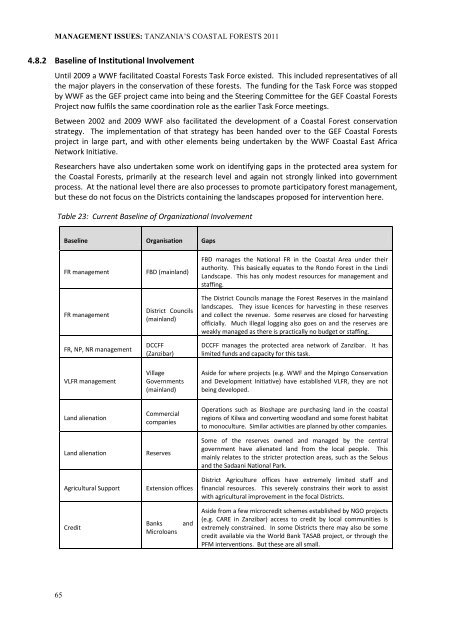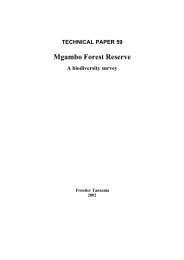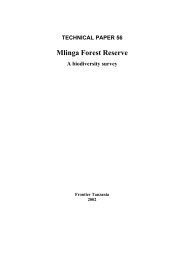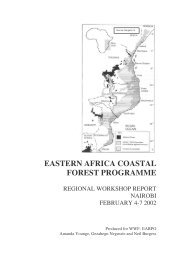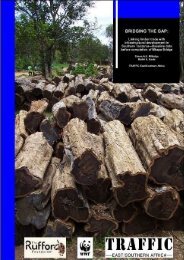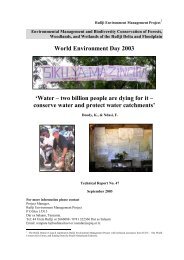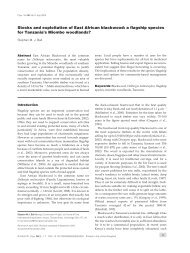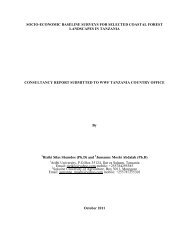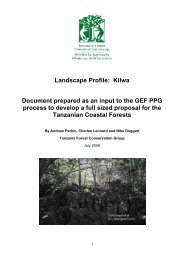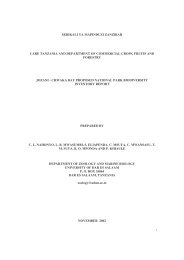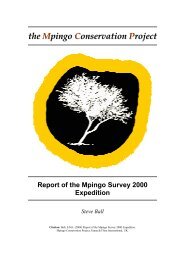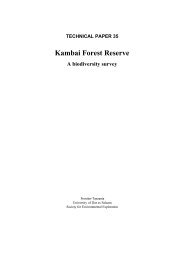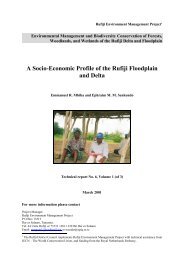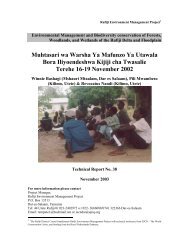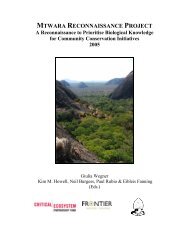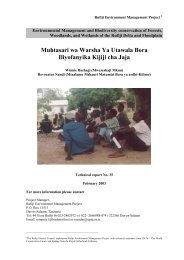Neil D. Burgess, Paul Harrison, Peter Sumbi, James Laizer, Adam ...
Neil D. Burgess, Paul Harrison, Peter Sumbi, James Laizer, Adam ...
Neil D. Burgess, Paul Harrison, Peter Sumbi, James Laizer, Adam ...
Create successful ePaper yourself
Turn your PDF publications into a flip-book with our unique Google optimized e-Paper software.
MANAGEMENT ISSUES: TANZANIA’S COASTAL FORESTS 2011<br />
4.8.2 Baseline of Institutional Involvement<br />
Until 2009 a WWF facilitated Coastal Forests Task Force existed. This included representatives of all<br />
the major players in the conservation of these forests. The funding for the Task Force was stopped<br />
by WWF as the GEF project came into being and the Steering Committee for the GEF Coastal Forests<br />
Project now fulfils the same coordination role as the earlier Task Force meetings.<br />
Between 2002 and 2009 WWF also facilitated the development of a Coastal Forest conservation<br />
strategy. The implementation of that strategy has been handed over to the GEF Coastal Forests<br />
project in large part, and with other elements being undertaken by the WWF Coastal East Africa<br />
Network Initiative.<br />
Researchers have also undertaken some work on identifying gaps in the protected area system for<br />
the Coastal Forests, primarily at the research level and again not strongly linked into government<br />
process. At the national level there are also processes to promote participatory forest management,<br />
but these do not focus on the Districts containing the landscapes proposed for intervention here.<br />
Table 23: Current Baseline of Organizational Involvement<br />
Baseline Organisation Gaps<br />
FR management<br />
FR management<br />
FR, NP, NR management<br />
FBD (mainland)<br />
District Councils<br />
(mainland)<br />
DCCFF<br />
(Zanzibar)<br />
FBD manages the National FR in the Coastal Area under their<br />
authority. This basically equates to the Rondo Forest in the Lindi<br />
Landscape. This has only modest resources for management and<br />
staffing.<br />
The District Councils manage the Forest Reserves in the mainland<br />
landscapes. They issue licences for harvesting in these reserves<br />
and collect the revenue. Some reserves are closed for harvesting<br />
officially. Much illegal logging also goes on and the reserves are<br />
weakly managed as there is practically no budget or staffing.<br />
DCCFF manages the protected area network of Zanzibar. It has<br />
limited funds and capacity for this task. <br />
VLFR management<br />
Village<br />
Governments<br />
(mainland)<br />
Aside for where projects (e.g. WWF and the Mpingo Conservation<br />
and Development Initiative) have established VLFR, they are not<br />
being developed. <br />
Land alienation<br />
Land alienation<br />
Agricultural Support<br />
Commercial<br />
companies<br />
Reserves<br />
Extension offices<br />
Operations such as Bioshape are purchasing land in the coastal<br />
regions of Kilwa and converting woodland and some forest habitat<br />
to monoculture. Similar activities are planned by other companies.<br />
Some of the reserves owned and managed by the central<br />
government have alienated land from the local people. This<br />
mainly relates to the stricter protection areas, such as the Selous<br />
and the Sadaani National Park.<br />
District Agriculture offices have extremely limited staff and<br />
financial resources. This severely constrains their work to assist<br />
with agricultural improvement in the focal Districts.<br />
Credit<br />
Banks<br />
Microloans<br />
and<br />
Aside from a few microcredit schemes established by NGO projects<br />
(e.g. CARE in Zanzibar) access to credit by local communities is<br />
extremely constrained. In some Districts there may also be some<br />
credit available via the World Bank TASAB project, or through the<br />
PFM interventions. But these are all small.<br />
65


